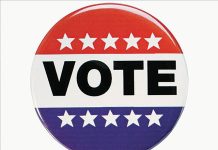It has been about four years since I walked into Columbus Signature Academy — New Tech High School to participate in a world religion panel. There were about five or six different representatives of various world religions present, including me, an evangelical Christian and a Muslim whom I would shortly befriend.
After the panel ended, I walked over to the Muslim participant, Nassim Khaled, and asked him if he would like to have lunch. He readily accepted my invitation.
This blossomed into a friendship that led to friendships with other Muslims in my community as well. Today, I have several Muslim friends in Columbus. Of course, those who know me well, know that it is difficult for me to be content with this not happening more often.
Before I continue, I must preface what I’m about to say by stating my beliefs, because misunderstanding can hamper the best of intentions. I am an evangelical Christian, so I don’t embrace the notion that there are many paths to salvation.
I believe that God sent his son Jesus Christ to die for the sins of humanity and that the only way to be reconciled to God is through repentance and trusting Christ by faith alone for salvation.
At the same time, I also believe in a pluralistic society where there is tolerance and mutual respect in the midst of our many differences. People should be free to espouse their different moral visions. The freedom of religious expression, whatever that religion may be, also must guarded as essential to furthering a just, pluralistic society.
For such a vision to function properly means differences of opinion, even about religion, should not divide us.
No matter if we come from a religious or nonreligious background, we need to look for resources in each belief system to help further a pluralistic society. People who hold to differing moral or religious visions need to locate those resources within their own worldview.
For me, the resources supplied in my own faith is the admonition of Jesus to love one’s neighbor, and a loving neighbor means getting to know people with different faith backgrounds. It also means knowing what they believe, and when there are disagreements, loving them despite those disagreements.
I have thought long and hard about how relationships between evangelicals like me and Muslims could be forged. My answer to this question began by identifying the roadblocks.
One hindrance is that most Americans, which includes evangelicals, have ingested what Edward Said called orientalism. This is a term he used to describe the Eurocentric bias of the West that fictionalizes Arab and Muslim people and their beliefs and culture by reducing them to having beliefs and characteristics that supposedly all Arabs and Muslims have.
This is why one often hears many Americans refer to Muslims as if they all believed the same thing. Their beliefs, politics and culture are incredibly nuanced.
For many of us, religious belief oftentimes defines who we are as people. It supplies the worldview that informs how we look at life. So, people with worldviews not like our own may frighten us. To further mutual respect, getting to know people’s religious beliefs is a first step in eliminating these fears.
Similarly, many Muslims have beliefs about Christians that need to be re-examined. My call is for mutual understanding and abandoning stereotypes and caricatures.
The second hindrance is knowing exactly what the other person believes. As a Christian, I know what I believe. I am firmly committed to things like the deity of Christ, the substitutionary atonement and the virgin birth, among other cardinal doctrines.
Over the years, my personal faith has been informed partly by having the fortunate opportunity to be trained in graduate school by some fine Christian scholars. I studied subjects like philosophy, theology, church history, cross-cultural ministry and various aspects that pertain to religious studies. So, I am very familiar with what Christians believe and the many nuances of those beliefs.
What I didn’t have was a thorough understanding of what my Muslims friends believed.
How wonderful would it be if Muslims could articulate what Christians believe as well as Christians themselves? Conversely, wouldn’t it be helpful if evangelicals could accurately articulate what Muslims believe and not resort to the orientalist viewpoint. It eliminates fear if you really know what the other person believes.
Recently, my intellectual curiosity got the best of me regarding this issue, so I began to search out a graduate program in Islamic studies to do a serious study about Islam. During my search, I decided to enter a program where I could be trained by Muslim scholars. This way, any orientalist proclivity I had could be re-examined.
As a result, I dually enrolled in the Master of Arts program at Islamic College of London and Middlesex University respectively. I have learned so much already that will assist me in fostering mutual understanding of the two faiths, with the hope of helping Muslims and other Christians forge similar relationships.
I look forward to continuing to learn more about my friends’ faith as well as sharing with them the finer points of my own faith. My hope is that others will want to, too.
Tim Orr of Columbus is an adjunct faculty member in religious studies at IUPUC, where he has served for more than eight years. He is the author of two books. His latest book is, “Islam Rising: How the Christian College Can Equip the Next Generation.” He can be reached at [email protected].




